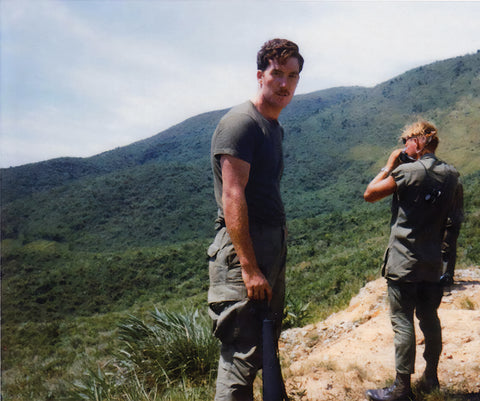
No Rules For Generals in Vietnam?
In autumn 1969, I was stationed in a bunker on the radio. I was to communicate with the perimeter guards and helicopters if in trouble. If we were attacked, I was the one that blew the sirens. The infantry would scream on the radio, “Rockets in the air!” That was my cue to blow sirens. This particular month we changed our radio call sign from Roadrunner to False Minder. The operating manual was sent to all stations on my network. Our orders were not to answer someone using the wrong call signs.
Hawk 6
Evidently generals do not have to read these manuals each month. One day the commanding general of the 1st Aviation Brigade was flying to my base. He was known as Hawk 6 on the radio. So he called on the radio, “Roadrunner, Roadrunner. Hawk 6.” He was not using the right call sign, so I did not answer.
Radio operators’ standing orders are to obey proper radio procedures, one of which is to only answer proper call signs. That is a security standard. It prevents the enemy who could be monitoring our network from identifying all the units calling on a network. The general must have thought he was out of range, so a few minutes later I heard, “Roadrunner, Roadrunner! This is Hawk 6.”
This is when I did the bravest thing I did in Vietnam. I did not answer. Despite the orders not to answer someone using the wrong call signs, I was scared. I knew I would pay a price for this. I heard the anger in his voice when he came back with, “Anyone on this net know where Roadrunner is?” The response came in, “I don’t know, sir.” In two sentences all sorts of security violations occurred. One, by a general. The other referring to him as “sir.”
Enter The Captain
He was only calling for a ride. Let him walk like everyone else, I thought. I can only imagine what the door gunners and crew chiefs thought when they saw a general walking.
this article first appeared in vietnam magazine
The next person I saw was my captain. He came running into the bunker. His face was as red as Santa Claus’s suit. He was screaming, “Did you hear Hawk 6 on that radio?” I said, “Yes, sir.” That shocked him. There were only two ways I would not hear him: I was not there (AWOL) or asleep (dereliction of duty). Both were court-martial events.
“Why didn’t you answer him?” demanded the captain. I replied, “He was using the wrong call signs.” For a moment he did not know what to say. Then he said, “I don’t care if he calls you ‘Asshole’! You answer Hawk 6!”If I were truly brave, I would have asked for that order in writing, but I was a 20-year-old kid and he was as angry as any man I ever saw and had a .45 on his hip. I thought he might shoot me. And I had June 15, 1970 [the day I would leave Vietnam] on my mind.
I was sure there was a court-martial in my future, but if my defense was going to be that the general was using the wrong call signs, no one was going to embarrass a three-star general. I wondered where the list was of orders that you are not supposed to follow. I also wondered if my captain, when he reported back to the general, had the moxie to tell him that he was using the wrong call signs.
Good Decisions?
In November we changed our call sign to Roadrunner. When I left Vietnam in June, we were still Roadrunner. Apparently not troubling a general was more important than radio security.
I Googled the general years later because I wanted to see who he was. It was Allen Burdett Jr. When I read about him, it said he loved to be known at Hawk 6, so I knew I had the right guy. The other thing I read about him [from the Army Aviation Association of America] was that “in a subsequent Vietnam tour, he commanded the 1st Aviation Brigade during 1968-1970, tough and demanding years in the Vietnam War, where, as Hawk 6, he was known throughout Vietnam for his astute planning and tactical acumen.”
Acumen means the ability to make good judgments and quick decisions. To me making good judgments means reading your operating manuals and using the correct call signs. Compare this story to Adm. McCraven’s writings on duty.
After leaving Vietnam in 1970, James Vaughn became a CPA and ran his own tax practice.
This story appeared in the 2024 Winter issue of Vietnam magazine.
historynet magazines
Our 9 best-selling history titles feature in-depth storytelling and iconic imagery to engage and inform on the people, the wars, and the events that shaped America and the world.
